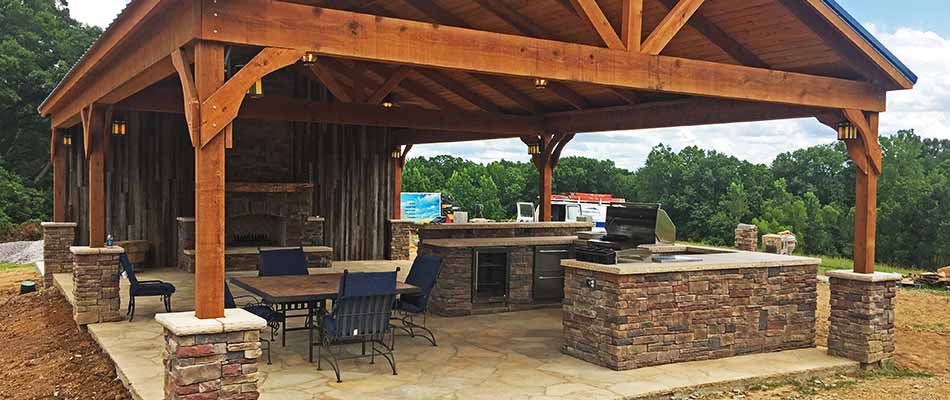Having an outdoor kitchen is one of the most enjoyable amenities to have during the spring and summer! They provide an excellent opportunity for entertaining family and friends and help keep your home cooler by preparing and cooking meals outdoors.
However, when winter comes rolling in, it is important to take extra care in preparing your outdoor kitchen for its period of inactivity. Winterizing your outdoor kitchen is about the only maintenance required to keep it in good working order. However, this maintenance is extremely important if you want to avoid costly repairs and replacements for your outdoor kitchen.
Prevent Frozen Water Lines & Damaged Appliances by Shutting off the Water Supply
During the winter, water lines have the potential to freeze up and that can cause damage to both the water lines and the appliances they are hooked up to. First, make sure to locate and completely shut off the water supply that leads to your outdoor kitchen.
Use the indoor shutoff when you cut off the water supply. This way you have no water running in any of the outside water lines.
Major appliances, such as an icemaker or a refrigerator, should be double-checked to ensure all water is drained from the lines as well.
Clean Your Appliances in the Fall
Everything in your outdoor kitchen should be thoroughly cleaned before winter. A fall cleaning allows your appliances to remain clean and be ready to go in spring! Here are some cleaning suggestions for a few different components of your outdoor kitchen.
Cooking Grill
Use a degreaser to clean your grill prior to putting it away for the season. Get hard to reach places with a metal brush and carefully clean all of the cooking grates. If you plan on not using your grill during the winter, make sure to shut off and disconnect the gas.
Refrigerator
Turn off the unit. Remove all food items, thoroughly clean the inside with soap and water, and wipe dry. Remove the front grill and make sure all debris and dust are vacuumed out from below. Leave the refrigerator uncovered throughout the winter to prevent moisture from being trapped and damaging the appliance.
Outdoor Sink
Leave both the hot and cold taps thoroughly open after the water lines have been drained. Clean the sink and cover it for the winter.
Ice Maker
Turn the icemaker off and remove any leftover ice from inside the icemaker. Take the time to clean the bin out thoroughly with soap and water.
Winterizing Your Cabinetry Based on Their Material Composition
Winterizing your outdoor kitchen also means taking time to winterize your outdoor cabinets. The type of material your cabinetry is composed of will determine how you winterize them. Stainless steel cabinets will need a fresh layer of stainless steel polish. Wood cabinets need to be oiled or sealed to protect it from outdoor winter weather.
Make sure to empty your cabinets of any items or food that need to be stored indoors during the winter.
How to Prepare Your Outdoor Fire Pits & Fireplaces for Winter
Although your fire pit or fireplace may not be attached to your outdoor kitchen, now is a good time to make sure you winterize them as well. Very little maintenance is needed in this department to prepare them for winter and keep them ready for spring!
Remove all debris from the area. If your fire pit or fireplace uses gas, make sure to turn off the supply. Wrap the area with a weatherproof cover to protect them from the cold and snow.
Best Time to Winterize Your Outdoor Kitchen, Fireplace, & Fire Pit
A little winterizing can go a long way to keep your outdoor kitchen and entertaining area in good condition. Take time to prepare your property in late fall before bad weather hits. During your fall cleanup time is a good opportunity to start preparing your outdoor kitchen, fireplace, and fire pit for winter!

